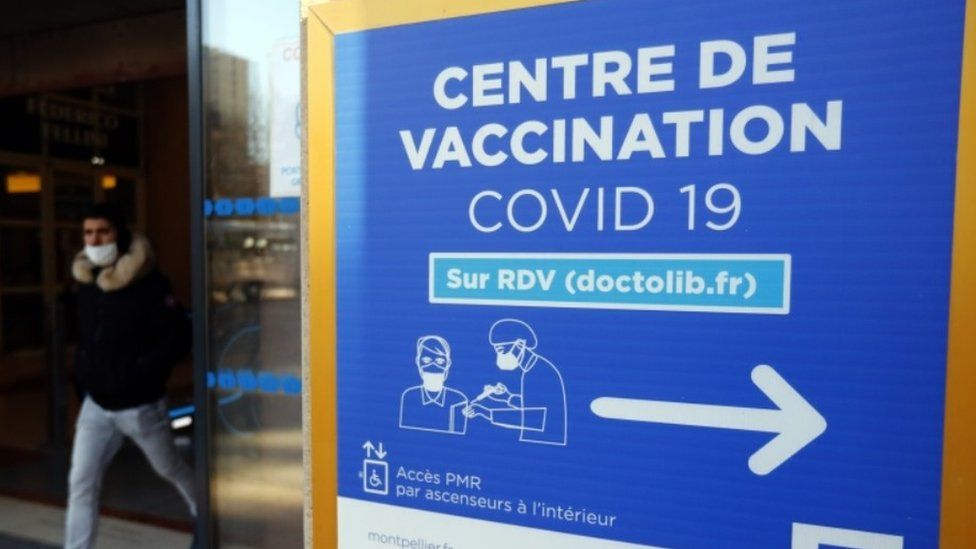Covid: France restricts AstraZeneca vaccine to under-65s
- Published

The French health authority has said AstraZeneca's Covid-19 vaccine should only be given to people aged under 65.
It is the latest recommendation from an EU member state approving the jab with such restrictions, citing insufficient data on its efficacy for older people.
The EU drugs regulator has approved the Oxford-AstraZeneca vaccine for all adults, but it is up to each member to set its own rollout policy.
Germany and Austria have already recommended it be limited to under-65s.
There has been criticism of the slow pace of vaccinations in the EU and the campaign has been hit by delays to deliveries of the AstraZeneca and Pfizer vaccines, among others.
The European Commission - the EU executive - was caught up in a row with AstraZeneca last week, after the company said it could not supply the expected doses on time.
The president of the Commission, Ursula von der Leyen, in particular, has been under fire for her own handling of the rollout, but she defended her stance on Tuesday. "I am convinced that the European strategy on vaccination is the right one," she told France's Le Monde.
German Chancellor Angela Merkel also backed the EU's approach in a TV interview.
What did French officials say?
The health regulator said there was still not enough data about the effectiveness of the AstraZeneca vaccine for patients over 65 years of age.
"These data will arrive in the coming weeks. In the meantime we recommend its use for people under 65 years old," it said. It recommended the vaccine for health workers and vulnerable people between the ages of 50 and 65.
More than 1.5 million people have received a Covid vaccine so far in France. In the UK, which has a similar population, more than 10 million doses have been given.
European Affairs Minister Clément Beaune told French radio on Monday that the British were "taking a lot of risks in this vaccination campaign" by spacing delays between two injections.
"Here scientists say we shouldn't do this," he added. UK health officials have defended the plan, despite criticism.
What have other EU countries decided about AstraZeneca?
Last week Germany's vaccine commission said it could not recommend the use of the jab in people aged over 65.
On Tuesday health authorities in Sweden and Poland made similar announcements and Belgium's health minister said the vaccine, for the moment, would only be given to people below the age of 55. Italy's medicines agency on Saturday also approved the jab for all adults under 55.
Scientists at Oxford University, meanwhile, have said the vaccine could lead to a "substantial" fall in the spread of the virus, in a study yet to be formally published.
Individual EU countries are free to decide who vaccines should be given to once they have been approved at EU level.
In her TV interview on Tuesday, the German chancellor said "every vaccine is welcome in the European Union", adding that good data had emerged for the Russian Sputnik V vaccine.
What did von der Leyen say?
In her interview with Le Monde, Ursula von der Leyen admitted that the EU had made missteps.
"When you make urgent decisions - and in this year of crisis we've taken around 900 - there's always the chance of missing something," she said.
But she said 18 million vaccine doses had been delivered across the EU so far and many more would follow over the next two months. "We are on the right track," she said.
Ms van der Leyen also implied that the UK's early success in its vaccination programme came as the result of readiness to compromise on safety standards.
Countries which started vaccinating people ahead of the EU "resorted to emergency authorisation procedures", she said.
"The commission and member states agreed not to compromise on safety and efficacy requirements."
What do we know about the vaccine?
Britain has been using the vaccine made by AstraZeneca, a UK-Swedish pharmaceutical firm, in its mass immunisation programme for weeks.
UK health officials say it is safe and provides "high levels of protection" for all ages. Research has shown it is highly effective.
No-one who received the Oxford vaccine in trials was hospitalised or became seriously ill due to Covid.
The vaccine is given via two injections to the arm, the second between 4 and 12 weeks after the first.
Covid vaccine safety: How does a vaccine get approved?
When it approved it last week, the EU's European Medicines Agency (EMA) noted that most participants in test studies were under 55 years of age.
It said that while there were not yet enough results to show how well the vaccine will work in older people, "protection is expected, given that an immune response is seen in this age group and based on experience with other vaccines".
AstraZeneca has said a US study will shortly provide additional data on the vaccine's efficacy in older adults.
Related Topics
- Published29 January 2021
- Published30 January 2021
- Published29 January 2021
- Published29 January 2021
- Published28 January 2021
- Published7 May 2021
- Published28 January 2021
- Published29 January 2021
- Published27 January 2021
- Published26 January 2021
- Published23 January 2021
- Published18 March 2021
- Published10 January 2021